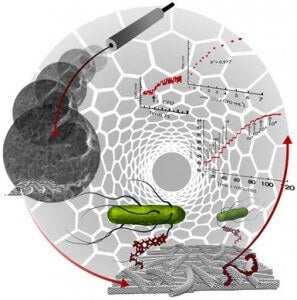
Drinking the water in a foreign country always seems like something of a gamble. Could be clean, could be a one way trip to spending the entirety of your vacation in the bathroom. Luckily, a research team at Rovira i Virgili University in Tarragona, Spain has developed a biosensor that can detect bacteria at levels as low as 1 cell per 5 mL of water. As reported in FECYT and SINC, the project utilized carbon nanotubes and fragments of DNA to detect Salmonella tyhpi, the bacteria that causes Typhoid Fever. And the best part? Water can be tested in just a few seconds.
Bacterial infections may be an inconvenience to tourists, but they are down right deadly to third world citizens. Water borne pathogens account for millions of deaths each year world wide. Typhoid Fever alone claims 500,000+ each year according to the WHO. A quick test for pathogens will greatly increase the safety of potable water, and avoid the pandemics that often accompany infected wells. If the technology can be adapted to other bacteria…we may be talking about millions of lives saved each year.
The biosensor works like a microscopic bacteria trip wire. Detection of bacteria hinges on the use of aptamers, fragments of DNA or RNA that bond to particular molecules. The Spanish team was able to develop a method of securing aptamers to the inside of carbon nanotubes. After being in the presence of Salmonella bacteria for a few seconds, those aptamers latch on to the cells. This shift generates a mild electric signal that can be detected almost instantly. Bacteria beware!
It’s remarkable that the Salmonella biosensor can find a single bacterium in 5mL of water. That’s like finding a lost dog in Central Park. Even more impressive, the count of bacteria can be determined quantitatively up to 1000 per mL. So you not only know if there’s a pathogen in your water, you can track the relative levels of the pathogens. This will help doctors and epidemiologist describe and predict the spread of disease.
The next big step for the Spanish biosensor is to find or adapt more aptamers so that other pathogens can be detected in the same manner. That may seem like a tall order, but remember that biosensors based on nanotechnology aren’t exactly new – we’ve even seen them for lung cancer breathalysers. The proverbial ‘lab-on-a-chip’ is getting closer to reality every day. Making microscopic objects as quickly and easily detected as pH will revolution medicine. And it should help you avoid losing precious beach time to Montezuma’s revenge.


